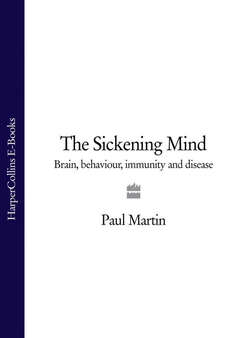Читать книгу The Sickening Mind: Brain, Behaviour, Immunity and Disease - Paul Martin - Страница 22
AUTOIMMUNITY
ОглавлениеIn addition to destroying potentially harmful antigens, the immune system must be able to identify and avoid attacking its own body. Discriminating accurately between ‘self’ and ‘non-self’ is a fundamental requirement. There are times, however, when this discrimination fails for some reason and the immune system starts attacking ‘self’. B-lymphocytes manufacture antibodies against other cells in the body and these autoantibodies start to attack healthy tissue. The result is an autoimmune disorder. Those who liken the immune system to an army repelling foreign invaders have used the illuminating metaphor of ‘friendly fire’ to describe the phenomenon of autoimmunity.
Autoimmunity is thought to play a role in at least twenty (and perhaps in excess of forty) diseases, and the list is growing. Among those included are rheumatoid arthritis; various thyroid disorders such as Graves’s disease and Hashimoto’s disease; primary biliary cirrhosis of the liver; systemic lupus erythematosus; Guillain-Barré syndrome; multiple sclerosis; diabetes mellitus; uveitis; pernicious anaemia; myasthenia gravis; and inflammatory bowel disorders such as celiac disease, ulcerative colitis and Crohn’s disease.
The mechanisms of autoimmunity are not fully understood. Certain autoimmune diseases appear to arise because cells become altered in various ways – perhaps by viral infection or mutation – so that the immune system no longer recognizes them as ‘self’. In other cases, autoimmunity results from a failure in the complex and delicately balanced mechanisms that regulate the immune system.
Genetic factors are known to play an important role in some autoimmune disorders. For example, insulin-dependent diabetes mellitus (otherwise known as childhood-onset diabetes) results from the autoimmune destruction of cells in the pancreas, the organ responsible for producing the blood sugar-regulating hormone insulin. Diabetics have a genetic predisposition to develop the disease. But environmental factors, including stress, also play their part in determining whether a genetically predisposed individual actually develops the disease. Even if one of a pair of genetically identical twins has diabetes there is still a 50–70 per cent chance that the other twin will not get the disease. Chronic psychological stress significantly increases the risk that those who are genetically predisposed will advance to full-blown diabetes.
Females are much more susceptible than males to a number of autoimmune diseases, and this is true both in humans and other species. Women are three times more likely than men to suffer rheumatoid arthritis, six times more likely to develop autoimmune thyroiditis, and at least ten times more likely to suffer from systemic lupus erythematosus. This sex difference in disease susceptibility is at least partly a consequence of hormonal differences; male and female sex hormones, such as testosterone, progesterone and oestradiol, influence the immune system in various ways.
Autoimmune diseases result from excessive or inappropriate immune activity. Accordingly, they may be ameliorated by drugs that suppress the immune system – the opposite of what happens in normal infectious diseases. This is why doctors use immune-suppressive drugs to treat autoimmune diseases.
